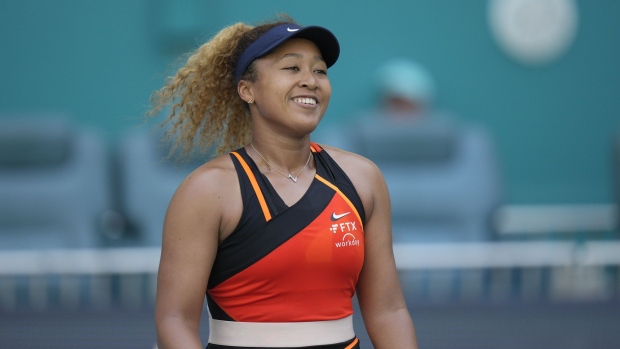Mar 30, 2022
Mental-Health Services Come to Women’s Tennis, Inspired by Osaka
, Bloomberg News

(Bloomberg) -- Faced with growing evidence that celebrated athletes are struggling with the pressures of competition and intense media scrutiny, the governing body of women's tennis is turning to a well-funded California startup for help.
The Women's Tennis Association agreed to a deal with Modern Health to produce a five-part video series featuring some of the sport's top players in order to raise awareness about mental-health challenges among athletes. The San Francisco-based company will also offer players the chance to connect with mental-health coaches and therapists in its network. The WTA has more than 1,600 members who could be eligible to use the services. Financial terms weren’t disclosed.
Modern Health, valued at $1.2 billion in its most recent fundraising round, is backed by high-profile venture-capital firms including Kleiner Perkins, Founders Fund and Y Combinator. It counts animation giant Pixar and financial-services provider SoFi Technologies Inc. among its clients, according to founder and Chief Executive Officer Alyson Watson.
Some top female tennis players have grappled with mental-health challenges in recent months. Naomi Osaka withdrew from the French Open last year, citing struggles with depression. Twenty-five-year-old Ash Barty retired this month while ranked as the No. 1 player in the world, saying she no longer had the “emotional drive” to compete at the top levels.
While many professional athletes are under pressure to perform, tennis can be especially daunting because players often lack the infrastructure and support common in team sports. Social media has contributed to players' sense of being under the microscope.
“I prioritize my well-being above everything and mental health is equally as important to me as the physical (if not more),” Osaka said via email. “Much like I work with a coach on my forehands and backhands, I work with an expert therapist.”
The Covid-19 pandemic has increased feelings of stress and isolation for many people, leading to a surge in demand for therapy and other kinds of mental-health care. That trend has converged with growing investor interest in telehealth companies that can deliver treatment over the internet, eliminating the need to travel to a doctor’s office. The privacy telehealth offers can make it a more comfortable option for mental-health care, advocates say, though some companies have faced questions about their effectiveness.
Destigmatizing Care
The WTA and Modern Health are hoping to destigmatize mental-health problems among professional athletes and help players who struggle with them. The public has long expected pro athletes to perform regularly at the highest level for millions of viewers, and social media has made it that much harder for athletes to shield their private lives or ignore criticism.
“Athletes are supposed to be invincible,” said Micky Lawler, president of the WTA. Mental health “shouldn’t be seen as a weakness, but evaluated like every other part of an athlete’s health.”
While pro sports leagues have tried to protect the physical well-being of players for decades, their concern for their athletes’ mental health has increased. Adam Silver, commissioner of the National Basketball Association, lamented several years ago that many of his players are unhappy.
The WTA said it has provided mental-health support for more than 20 years, but its staff is too small to look after the needs of all the players. Modern Health will help connect players with follow-up care or access to a clinician.
“Let’s say a player is struggling and needs support outside of what the WTA has, they can lean into us,” said Watson, who played lacrosse in college. The WTA players won’t have access to its full suite of services, Watson said.
©2022 Bloomberg L.P.


